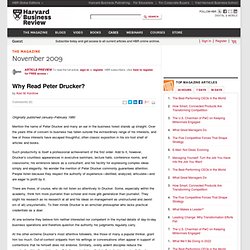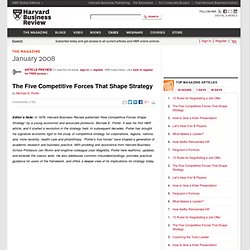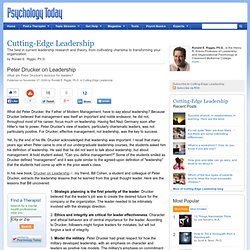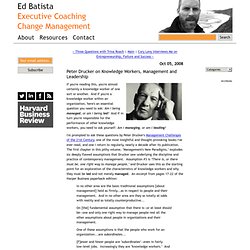

The Best Of Peter Drucker. Why Read Peter Drucker? The Idea in Brief • Peter Drucker’s extensive, thoughtful writing about the management of organizations has garnered both zealous disciples and dismissive critics. • The point with Drucker is to read not primarily for the ideas, though they are both useful and interesting, but rather to learn from the way he thinks. • Drucker’s real contribution lies in his integrative, holistic thinking; fair-mindedness; and dispassionate objectivity.

One can learn more—and more deeply—from observing the discipline of his mind than from studying the content of his thought. Originally published January–February 1980 Mention the name of Peter Drucker and many an ear in the business forest stands up straight. Such productivity is itself a professional achievement of the first order. Digital_Humanities - 9780262018470_Open_Access_Edition.pdf. The Drucker Institute. Peter Drucker on the profession of management. Click here to skip to this page's main content.

Hello! Open Library is participating in our eBook lending program. Browse the growing lending library of over 250,000 eBooks! Site Search Full Text Search? Log in / Sign Up One web page for every book. Last edited by ImportBot January 28, 2012 | History Peter Drucker on the profession of management 1 edition By Peter F. Go to the editions section to read or download ebooks. Peter Drucker on the profession of management Close Read Borrow eBook is checked out. Physical copy, local WorldCat Buy Alibris Amazon AbeBooks Biblio.com Book Depository Powells. Peter F. Drucker Bibliography - Business Research Launch Pad. Chapter4_summary.pdf. What Business Can Learn from Nonprofits. The Five Competitive Forces That Shape Strategy. Editor’s Note: In 1979, Harvard Business Review published “How Competitive Forces Shape Strategy” by a young economist and associate professor, Michael E.

Porter. It was his first HBR article, and it started a revolution in the strategy field. In subsequent decades, Porter has brought his signature economic rigor to the study of competitive strategy for corporations, regions, nations, and, more recently, health care and philanthropy. “Porter’s five forces” have shaped a generation of academic research and business practice.
With prodding and assistance from Harvard Business School Professor Jan Rivkin and longtime colleague Joan Magretta, Porter here reaffirms, updates, and extends the classic work. In essence, the job of the strategist is to understand and cope with competition. As different from one another as industries might appear on the surface, the underlying drivers of profitability are the same. The Five Forces That Shape Industry Competition Forces That Shape Competition. What_can_we_learn_from_thebest_non-profit_organizations.pdf. Table of Contents: Classic Drucker : Drucker: Treat Employees Like Volunteers. Lousy leaders think pay checks are permission to treat people like slaves.

Control: I caught an awkward glimpse of myself when I asked my wife, “Would you like me to tell you what I think you should do?” Peter Drucker on Leadership. What did Peter Drucker, the Father of Modern Management, have to say about leadership?

Because Drucker believed that management was itself an important and noble endeavor, he did not, throughout most of his career, focus much on leadership. Having fled Nazi Germany soon after Hitler's rise to power, Peter Drucker's view of leaders, particularly charismatic leaders, was not particularly positive. For Drucker, effective management, not leadership, was the key to success. Yet, by the end of his life, Drucker acknowledged that leadership was important. I recall that many years ago when Peter came to one of our undergraduate leadership courses, the students asked him his definition of leadership. In his new book, Drucker on Leadership, my friend, Bill Cohen, a student and colleague of Peter Drucker, extracts the leadership lessons that he learned from this great thought leader. 1. 2. 3. 4.
Tech360 We Staff I.T. – Drucker: Treat Employees Like Volunteers. I caught an awkward glimpse of myself when I asked my wife, “Would you like me to tell you what I think you should do?”

Peter Drucker on Knowledge Workers, Management and Leadership. If you're reading this, you're almost certainly a knowledge worker of one sort or another.

And if you're a knowledge worker within an organization, here's an essential question you need to ask: Am I being managed, or am I being led? And if in turn you're responsible for the performance of other knowledge workers, you need to ask yourself: Am I managing, or am I leading? I'm prompted to ask these questions by Peter Drucker's Management Challenges of the 21st Century, one of the most insightful and thought-provoking books I've ever read, and one I return to regularly, nearly a decade after its publication. The first chapter in this pithy volume, "Management's New Paradigms," explodes six deeply flawed assumptions that Drucker saw underlying the discipline and practice of contemporary management. In no other area are the basic traditional assumptions [about management] held as firmly...as in respect to people and their management.
What's the difference?